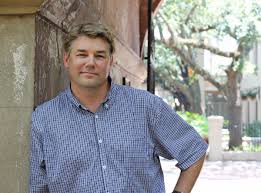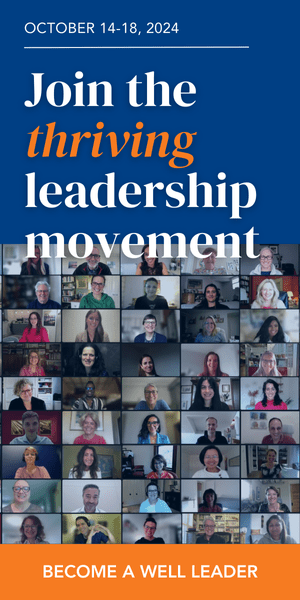As an Advisory Board member of the Biophilic Institute (a group with a mission to promote sustainability and wellbeing by helping communities transform themselves), I meet a lot of passionate people creating new ways of living and working that are full of purpose and lighter on the land. Brian Fisher is one such person. He’s the Director at College of Charleston’s Office of Sustainability, and we—along with a small group of committed others—are co-creating a sustainability internship based at Serenbe, a thousand-acre eco-community south of Atlanta. As a way to put their book learning into real-life practice, the internship will provide the College’s grad and undergrad students the opportunity to study the successes and challenges of building a community using sustainability principles.
During our conversations I quickly discovered: Brian has a transformative vision that goes well beyond a single course or an office of sustainability; his brain focuses on the bigger picture of designing a sustainable world. “I will never see that world in my lifetime but that’s OK, we have to start now before we dig a hole so large that it takes generations just to get out,” he says. “I’m motivated by enhancing student’s growth, personal and professional, and providing experiences that lead toward collective learning. It’s collective learning and what I call ‘justice’ that attracts and motivates me at my core.”
Building the Next Generation of Wellbeing Leaders
It’s clear to me that Brian is among the rare breed that has taken on the mantle of cultivating the next generation of wellbeing leaders, which he believes is critical to our future. “Thriving is the goal, but in terms of evolution I’m not sure we’re even close to getting to a world where we thrive. I think that’s generations down the road,” he says. “This is the first time in the history of humanity that our lack of sustainability is a multi-generational problem and the only way to solve it is through combining generations and then building solutions that draw from the wisdom of each other.”
One way Brian builds wellbeing leaders of the future is by teaching them to ask questions. In general, he says, we don’t seek new answers to our sustainability challenges. We seem to settle for what is. “That’s part of the problem because if you’re not seeking new answers, you’re not even starting to ask deeper questions about why things are they way they are and how they can be better.” One of the big questions is how are we going to move forward, leaving our resource-depleting industrial model behind? To find the answer, the next generation is going to have to become eternal searchers and revisit their underlying purpose and values, he says.
After all, Brian points out, when we talk about leading wellbeing, we’re trying to get at how a deeper purpose and shared values drive how we live. “What is going to ultimately make us a more sustainable society is to develop a collective ability to learn in a way that produces new knowledge, richer meaning, and a shared capacity to act,” he says. “And that will help us evolve our purpose and values to be more just for all.”
Leading From the Middle
In his role at the College of Charleston, Brian is in touch both with the administration and with students every day. “I work between disciplines. I work with business affairs. I work with peers. Basically, I sit in the middle,” he says. He’s come to believe that’s where a capability for leading wellbeing really gets mobilized: with leaders in the middle. “That’s why I’m here and why I took the job, because I truly believe you have to do it from the center,” he says. Change doesn’t happen only with charismatic leaders at the top or thanks to motivating speeches; there are challenges at every level that people in the center are uniquely positioned to tackle. “When I was younger, I thought great leadership was only Martin Luther King—one individual with big speeches,” he says. Over time he’s realized that Martin Luther King had a whole support system behind him. “You need people in the middle who can strategically work in all directions.”
Operating from the middle can create turbulence through the whole system, which is how it generates the space for opportunities, Brian says, but the turbulence also creates waves through the system that can be difficult to manage and makes you more professionally and personally vulnerable. It requires, therefore, transformative, wellbeing leadership at its core. Leaders in the middle who are grounded in a deeper, life-enhancing purpose for themselves and others will be well equipped to mobilize the principles and practices of wellbeing and sustainability throughout an organization or society.
The Power of Being Your Authentic Self
Brian says that the role of building the next generation of wellbeing leaders also means getting in tune with what creates wellbeing for himself. Being clear about his life purpose helps him operate from a sustainable source of personal passion, motivation, and authenticity. But it took a while for him to get there. As a young man who was one of the few in his peer group who went to college, he chased the American Dream. “But then I made a lot of money and realized that that American Dream felt extremely hollow. It didn’t motivate me,” he says.
“Now, I don’t think I’m selfless, but I try to be authentic and genuine about everything that I do, full of passion because I believe in my larger mission to revitalize our communities. I really believe that mission is also what my country stands for, and I think we’re losing that. So all these things drive me.”
READ MORE
• 4 Ways to Make Wellbeing an Organizational Norm
• How a Culture of Wellbeing Drives Innovation for Blue Earth Network
• 4 Things Great Leaders Do (That The Rest Of Us Often Don’t) to Thrive
 Renee Moorefield
Renee Moorefield
A deep and early belief that the values of health and sustainability would remake the way we live, lead, and work in the 21st century led Renee to launch Wisdom Works with her husband David Moorefield in 1999. Ever since, she’s helped forward-thinking clients—including Apollo Group, Booz Allen Hamilton, Merck & Company, Centura Health, Western Union, and The Coca-Cola Company—embed wellbeing strategies to create inspired workplaces, develop caring relationships with citizens, and produce results that matter.







